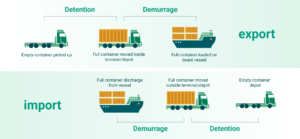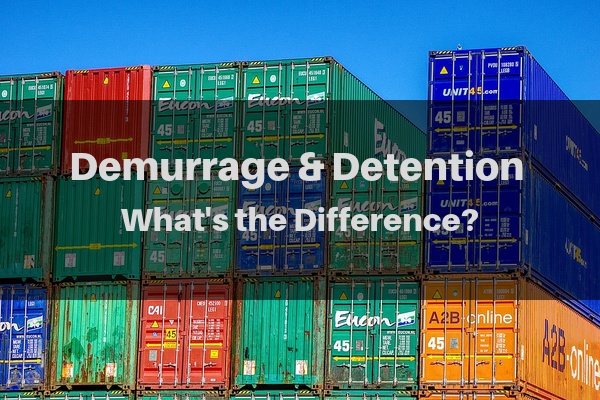We have reported on several occasions about detention charges that are billed back to importers, by shipping lines, on containers that are not returned to their designated de-hire depots within a defined “grace period” after unpacking. As a result of the current container shortage, the ocean carriers are becoming stricter in their application of detention fees on overdue box returns.
Certain lines have been asking for a security deposit on import containers as they are loaded on trucks, which is refundable if and when the empty container is de-hired within the specified period.
Container detention can be defined as a daily charge imposed by a carrier on a party – usually the consignee under a bill of lading – for the use of a shipping container. Once a container is available to be picked up at the port of discharge, shipping lines allow a period – generally 7 to 10 days – without charge for the container to be returned to a designated depot. Beyond that grace period, a daily rate is charged and can be as high as AUD 200 per day.
The free time commences from the first day the container is made available at the wharf. This is often a source of contention or misunderstanding, as many importers believe the clock shouldn’t start ticking until the container is collected from the wharf. They might reason that, even though their containers are made available for collection, they still might be unable to pick them up because Customs and Quarantine border processing restrictions are still pending. However, the 7 to 10 ‘calendar days’ (including public holidays and weekends) are actually incurred from midnight on the first day of the container’s discharge from the vessel.
Demurrage and Detention may both start with the letter “D” but that’s where their similarity ends. These two words, which importers often use interchangeably, have very different definitions. Shipping lines will apply detention charges for import containers returned after the expiry of the free time. Free time allowed is usually 7 -10 calendar days. Free days commence from midnight on the day of discharge from vessel.
- Demurrage relates to container storage at terminal (charged by the port)
- Detention relates to container usage (charged by the shipping line)

An importer can in fact end up paying both detention and demurrage fees on a single shipment. (Carriers can also leverage similar fees for exports). Obviously both the shipping lines and the port terminal operators benefit financially from demurrage and detention charges – although their stated goal is to improve the turnaround time of containers and get their equipment back quicker, to free it up for other customers to use.
As your appointed agent, our goal is to minimise these kinds of ‘hidden costs’ which are passed on to you and, at the end of the day, to the final consumer. We understand that containers are an essential part of the supply chain and they need to remain in circulation. For this reason, we monitor each and every step of the delivery process to minimise unnecessary and costly delays.
For more information about international shipping and handling of containers, contact us here at Colless Young. As licensed Customs Brokers and International Freight Forwarders we offer correct, professional advice on all your import and export consignments. We are based in Brisbane and provide a complete range of logistics services – including quarantine clearance & fumigation treatment – for airfreight and sea cargo at all Australian ports and airports.

